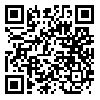Volume 20, Issue 6 (1-2022)
TB 2022, 20(6): 33-45 |
Back to browse issues page
Research code: IR.KHOMEIN.REC.1399.013
Ethics code: IR.KHOMEIN.REC.1399.013
Download citation:
BibTeX | RIS | EndNote | Medlars | ProCite | Reference Manager | RefWorks
Send citation to:



BibTeX | RIS | EndNote | Medlars | ProCite | Reference Manager | RefWorks
Send citation to:
Salami M, Salehi A, Momeni H, Azizi M. The Effect of Virtual Education on Self-Medication of Medical Sciences Students Based on the Health Belief Model. TB 2022; 20 (6) :33-45
URL: http://tbj.ssu.ac.ir/article-1-3278-en.html
URL: http://tbj.ssu.ac.ir/article-1-3278-en.html
khomein university of medical sciences , ma.azizi2020@gmail.com
Abstract: (2071 Views)
Introduction: Due to the high prevalence of self-medication among medical sciences students, according to previous research, the present study aimed to investigate the effect of virtual education on self-medication of medical sciences students based on the health belief model.
Methods: The present quasi-experimental randomized controlled study was conducted on 110 students of Khomein University of Medical Sciences in 2021. The students were divided into experimental and control groups (55 people in each group) through two-stage sampling. The method of data collection was a questionnaire based on the health belief model about self-medication. The questionnaire was completed by both groups before and after the educational intervention. In order to analyze the data, Chi-square and independent and paired t-tests were used using SPSS26 software.
Results: There was no significant difference between the scores of experimental and control groups before the intervention in the constructs of the health belief model. After the intervention, a significant difference was observed in the mean scores of knowledge (p=0.001) and perceived intensity (p=0.027) in the experimental group. However, no significant difference was observed in the mean scores of other constructs between the experimental and control groups.
Conclusion: Although virtual education intervention is effective in learning, it cannot provide a satisfactory quality of education. It is suggested that a study be conducted to compare the two methods of face-to-face and distance learning at the same time.
Methods: The present quasi-experimental randomized controlled study was conducted on 110 students of Khomein University of Medical Sciences in 2021. The students were divided into experimental and control groups (55 people in each group) through two-stage sampling. The method of data collection was a questionnaire based on the health belief model about self-medication. The questionnaire was completed by both groups before and after the educational intervention. In order to analyze the data, Chi-square and independent and paired t-tests were used using SPSS26 software.
Results: There was no significant difference between the scores of experimental and control groups before the intervention in the constructs of the health belief model. After the intervention, a significant difference was observed in the mean scores of knowledge (p=0.001) and perceived intensity (p=0.027) in the experimental group. However, no significant difference was observed in the mean scores of other constructs between the experimental and control groups.
Conclusion: Although virtual education intervention is effective in learning, it cannot provide a satisfactory quality of education. It is suggested that a study be conducted to compare the two methods of face-to-face and distance learning at the same time.
Type of Study: Research |
Subject:
General
Received: 2021/11/14 | Accepted: 2022/03/5 | Published: 2022/01/30
Received: 2021/11/14 | Accepted: 2022/03/5 | Published: 2022/01/30
Send email to the article author
| Rights and permissions | |
 |
This work is licensed under a Creative Commons Attribution-NonCommercial 4.0 International License. |







